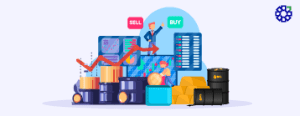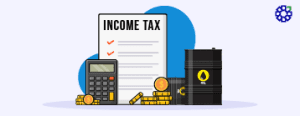Tips For Successful Commodity Market Trading
- 20th August 2025
- 12:00 AM
- 6 min read
Commodity trading is becoming increasingly popular due to the standardisation of trading and transportation infrastructure. If you are a beginner in the securities market, commodity trading may sound complex to you. However, with the right commodity market tips and strategies, you can gain substantial returns from this particular segment.
Here are the 7 effective tips for commodity trading you can implement to make a profit while investing in the commodities market.
7 Effective Strategies For Successful Commodity Market Trading
Before you trade commodities in the Multi-Commodity Exchange (MCX), you must implement these 7 tips for successful commodity trading:
-
Proper Use of Leverage
Commodity markets have a high level of leverage, which is approximately 12 times higher than that of the stock market. A leverage is the margin you have to pay for trading. Although leverage helps you to make a high profit, it may also increase your losses. Hence, you must analyse the benefits and drawbacks of leverage before trading in the commodity market.
-
Decode the Market Cycle for Smarter Moves
Another effective tip to gain higher returns from commodity trading is understanding the market cycle. The market may become unstable due to geopolitical instability, high demand for commodities, and other factors.
You must know these recurring market trends to identify them and address the potential challenges before investing.
-
Take Advantage of the Market Volatility
While the market contains highly volatile commodities, some of them are less volatile. These low-volatile commodities normally follow a set movement in a broader long-term trend. You must start trading comparatively low commodities. However, you must also consider your risk appetite and market knowledge in this case.
-
Choose the Right Broker for Your Trading Goals
One of the best tips for commodity trading is selecting the right broker. A right broker plays a crucial role in determining the advantages of commodity trading. Look for the charges it levies and have proven experience in market analysis before using its commodity trading platform.
You can download the PL Capital Group – Prabhudas Lilladher application to trade commodities and use its essential brokerage services. When you open a trading account with PL, you do not have to pay any annual maintenance charges.
-
Using Stop-Loss
You can also use the stop-loss feature to minimise losses, as there is a high leverage and high volatility in particular commodities. You must know when you exit from a trade to avoid overtrading.
-
Following the Geopolitical News
It is highly recommended to follow daily geopolitical news to address black swan events. Commodity prices are determined by a lot of factors, like micro and macroeconomic trends.
-
Tracking the Policies
Just like equities, commodity markets are also influenced by regulations and policies related to international trade, production, tariffs, and subsidies. Laws like liberalisation of the market for a commodity can help you predict its price movements.
Factors Influencing Commodity Prices in India
Before you start trading commodities in India, you must consider some factors that affect the commodity prices:
-
Macroeconomic Indicators
Macroeconomic indicators can influence commodity prices. If inflation rises, commodities become expensive. The demand for commodities might reduce since interest rates make borrowing expensive. As a result, commodity prices go down.
Contrarily, India’s GDP growth can boost demand and production, which makes the commodities more expensive.
-
Demand and Supply Dynamics
The dynamics of demand and supply play a pivotal role in the price determination of a commodity. When the demand is higher than the supply, commodity prices increase and vice versa.
-
Geopolitical Events
Geopolitical events like the Russia-Ukraine war and other political instability may result in supply chain disruptions, which can increase the price of commodities. Modifications in government policies, like taxes, can also impact the commodity prices.
-
Weather Conditions
Natural disasters such as earthquakes and wildfires may damage production and increase the prices of commodities. Additionally, weather conditions like drought may reduce agricultural crop yield and also increase prices.
4 Common Mistakes to Avoid in Commodity Trading
-
Trading With Emotion
Emotional trading and relying on impulses can lead to extreme losses. Therefore, you should have a trading strategy for which commodities you should rely on and at what prices you should buy to avoid costly trading mistakes.
-
Lack of Proper Research
You should avoid entering the commodities market without adequate research. Without an accurate context of commodities, you may not understand the meaning of each trade and end up making poor trading decisions.
-
Ignoring the Risk-Reward Ratio
To make unlimited profits, it may happen sometimes that you may overlook the risks involved in a particular commodity trading. This results in an unfavourable risk-reward ratio, where the possible gains do not justify the risks taken to open a position in a commodity derivative.
-
Poor Decision Making
Avoid poor decision-making to address unlimited risks in commodity trading, especially in highly leveraged positions. Try to make proper price predictions to avoid losses in commodity trading.
Final Thought
Understanding and applying these 7 effective tips for commodity trading allows you to make substantial gains and avoid losses. However, you must also avoid some mistakes like emotional trading, not doing proper research, and making poor decisions.
Open a trading account with PL Capital to place trades on commodities of your choice. With PL, you can use powerful tools and research-backed trading strategies in commodity trading.
Frequently Asked Questions
1. What does hedging mean in commodity trading?
Hedging in commodity trading means taking a futures position, which minimises the risks by locking in the positions.
2. Which is the most successful trading strategy?
There is no successful trading strategy which is best among all, since it depends on the investment goals and risk appetite of an investor. Some of the effective trading strategies are momentum trading, swing trading, scalping, and breakout trading.
3. Which is riskier, commodity trading or stock trading?
Commodity trading is riskier than stock trading. Stock markets have been seen to be more stable in the long run, compared to the commodity market.





